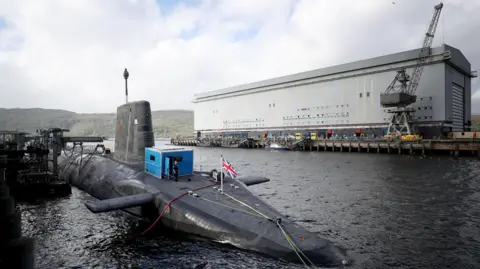
 PA Media
PA Media
HM Naval Base Clyde, Faslane, is the home of Britain's nuclear deterrent
Radioactive water from a Royal Navy nuclear weapons base leaked into a loch after old pipes repeatedly burst, according to official files.
The Guardian and The Ferret found the material was released into Loch Long, Argyll and Bute, after a six-year battle to access documents which involved Scotland's Information Commissioner.
The Scottish Environment Protection Agency (Sepa) said its assessments found the risk to the environment from effluent discharges was "of no regulatory concern".
The Ministry of Defence (MoD) also said there had been "no unsafe releases of radioactive material" into the environment.
The joint investigation revealed that files compiled by Sepa, a government pollution watchdog, stated the navy failed to properly maintain a network of 1,500 water pipes at the Coulport armaments depot.
It holds the Royal Navy's supply of nuclear warheads for its fleet of Trident submarines, which are based HMNB Clyde at Faslane, near Helensburgh.
Sepa said the issues at Coulport, which date back to a pipe burst in 2010, were caused by "shortfalls in maintenance".
The files said one incident, in August 2019, resulted in the release of "unnecessary radioactive waste" in the form of low levels of tritium, which is used in nuclear warheads.
The files were released after a ruling by Scottish information commissioner David Hamilton, who oversees the country's freedom of information laws.
The Guardian and The Ferret reported the UK government insisted the files had to be kept secret for national security reasons.
But in June, Mr Hamilton ruled that most had to be released as their disclosure threatened "reputations" not national security.
'No unsafe releases of radioactive material'
Sepa said it recognised the public interest in the naval base and was committed to ensuring that it operated "in accordance with standards equivalent to those in environmental regulations" to protect both the environment and the public.
A spokesperson added: "All discharges from HMNB Clyde, Sepa's monitoring data, and an assessment of potential environmental and public impacts are published annually in the Radioactivity in Food and the Environment (RIFE) report.
"Based on these assessments the risk to the environment from effluent discharges is of no regulatory concern."
They added an "extensive replacement programme for components" had already been undertaken and the agency was satisfied that the site had made "substantial improvements" to asset management and maintenance across both Faslane and Coulport.
A MoD spokesperson said: "We place the upmost importance on our responsibilities for handling radioactive substances safely and securely.
"There have been no unsafe releases of radioactive material into the environment at any stage.
"We frequently engage with regulators who report there is no significant impact on the environment or public health and are supportive of an open reporting culture."
.png)
 4 months ago
19
4 months ago
19








 English (US) ·
English (US) ·